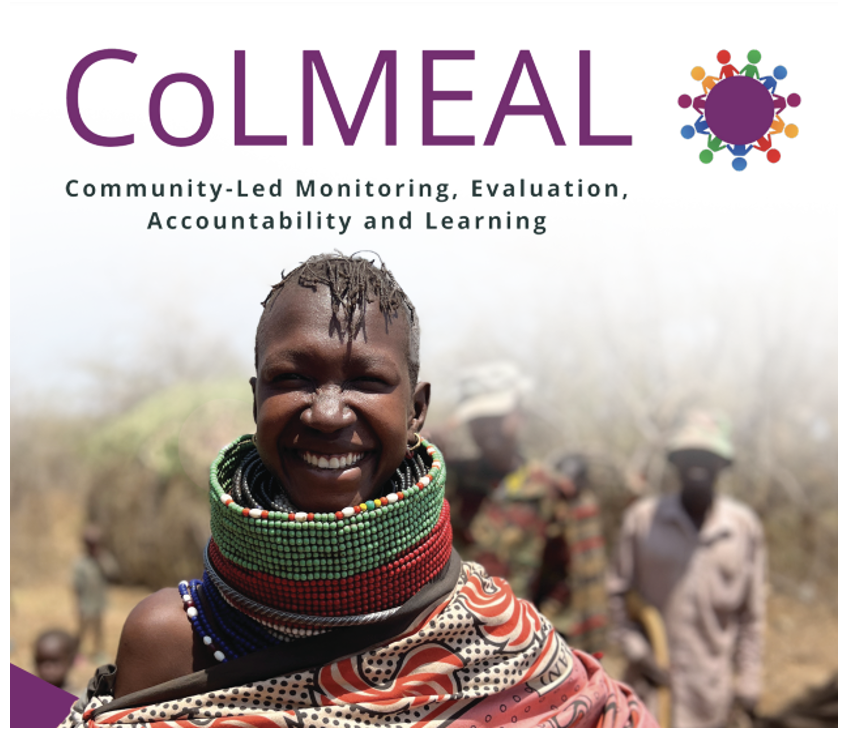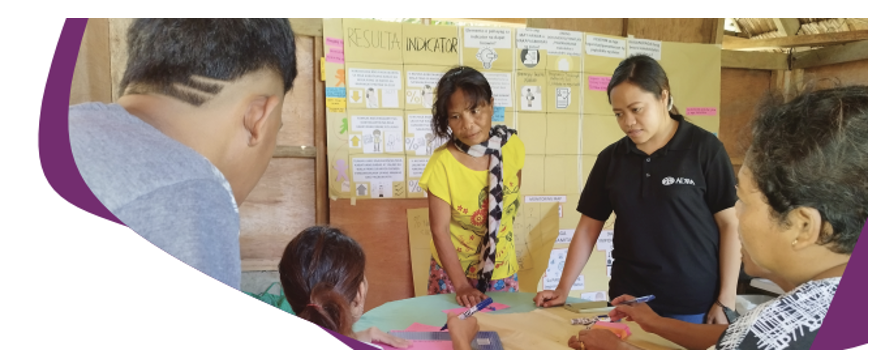Hello, AEA365 community! Liz DiLuzio here, Lead Curator of the blog. This week is Individuals Week, which means we take a break from our themed weeks and spotlight the Hot Tips, Cool Tricks, Rad Resources and Lessons Learned from any evaluator interested in sharing. Would you like to contribute to future individuals weeks? Email me at AEA365@eval.org with an idea or a draft and we will make it happen.

Greetings! I’m Paula Richardson from Salanga, an organization dedicated to reimagining monitoring and evaluation practices for community ownership, gender equality, and transformative change. Through our work with 50+ communities worldwide, we have gained insights and identified key takeaways from implementing a Community-Led monitoring, evaluation, accountability and learning approach (CoLMEAL).
CoLMEAL, which stands for Community-Led Monitoring, Evaluation, Accountability, and Learning, supports diverse community members, especially those facing social, political, or economic exclusion, in monitoring, analyzing, sharing, and reflecting on their community development plans. It empowers communities to take action and achieve their own goals while fostering local ownership, program sustainability, gender equality, good governance, and accountability. Here are some key takeaways to consider before embarking on the CoLMEAL journey:
Takeaway 1: CoLMEAL is not a replacement for project reporting
CoLMEAL builds upon existing data collection systems within communities and supports them in learning new skills, knowledge and systems to effectively collect and analyze data that they deem important and useful. In our experience the data collected is specific to the community and didn’t always align with our reporting needs for funders. In some communities, the indicators, methods, and strategies communities chose to implement weren’t compatible with our Performance Measurement Framework, or easily aggregated across multiple communities for our donor reporting purposes. In many cases CoLMEAL data was useful for our project, organizational and donor accountability – however this wasn’t the primary reason for or focus of ColMEAL. ColMEAL isn’t about using a participatory approach to collect data for donor reporting, it’s about facilitating and funding spaces for community stakeholders to lead and engage in MEAL processes, not as objects of observation or respondents, but as subjects and active drivers in design, data collection, analysis and dissemination. Implementing ColMEAL required us to fundamental shift our mind set around why data is collected, who data is for, and how it can be used to catalyze sustainable impact.
Takeaway 2: CoLMEAL requires allocated time, budget, and strong buy-in
Planning and budgeting for CoLMEAL implementation alongside traditional monitoring and evaluation activities is crucial for success. In our case we needed to intentionally design, resource and fund ColMEAL and project MEAL as two separate, yet highly integrated, program components. This included funding separate CoLMEAL officer positions who were responsible for supporting the community-level process. Setting up a robust CoLMEAL system takes time (i.e. between 10 – 12 months) and can conflict with other project start-up activities, especially traditional MEAL practices (think baseline data collection, Performance Measurement Framework finalization). This can put added strain on local staff and key community stakeholders if not planned and budgeted for in advance.

(Alt tag: A CoLMEAL group in the Phillipines discusses the data collected and reflects upon next steps for learning and sharing back to the community).
Takeaway 3: Facilitating CoLMEAL requires a focused investment in understanding and addressing power dynamics
Without a thorough understanding of existing power dynamics within the community, there is a risk of reinforcing inequalities. To avoid this, stakeholder power analysis and gender analysis are essential when implementing CoLMEAL. It is crucial to ensure that the voices of marginalized and vulnerable community members are included and actively engaged.
CoLMEAL offers a transformative approach to monitoring and evaluation by promoting community ownership, decision-making, and sustainability. Empowering communities and promoting evidence-based policies, CoLMEAL serves as a powerful tool for driving social change. While challenges exist, careful planning, investment, and stakeholder engagement can overcome them. By implementing CoLMEAL, we can harness the potential of monitoring and evaluation as a force for positive transformation. For more information about how to implement CoLMEAL and to explore key learnings, visit our website: https://salanga.org/colmeal/
Do you have questions, concerns, kudos, or content to extend this aea365 contribution? Please add them in the comments section for this post on the aea365 webpage so that we may enrich our community of practice. Would you like to submit an aea365 Tip? Please send a note of interest to aea365@eval.org . aea365 is sponsored by the American Evaluation Association and provides a Tip-a-Day by and for evaluators. The views and opinions expressed on the AEA365 blog are solely those of the original authors and other contributors. These views and opinions do not necessarily represent those of the American Evaluation Association, and/or any/all contributors to this site.
